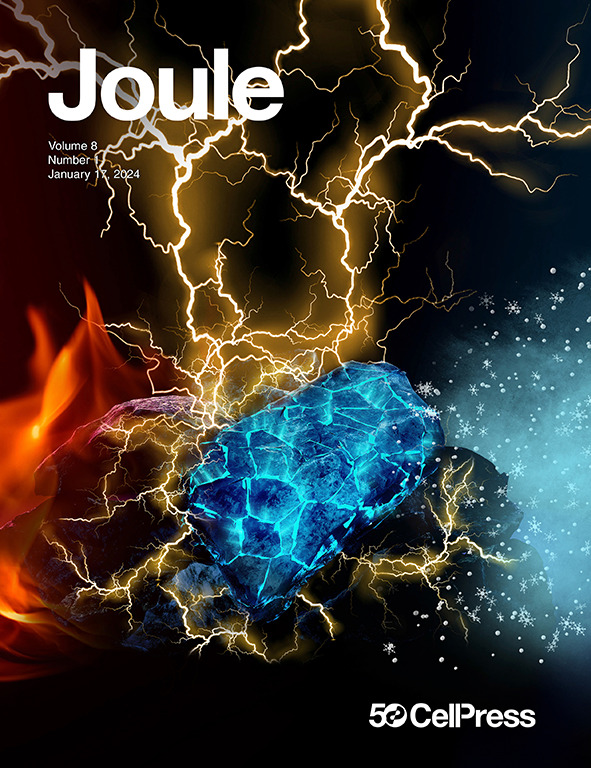Harnessing triboiontronic Maxwell’s demon by triboelectric-induced polarization for efficient energy-information flow
IF 35.4
1区 材料科学
Q1 CHEMISTRY, PHYSICAL
引用次数: 0
Abstract
Maxwell’s demon seemingly violates the second law of thermodynamics, but in reality, it requires external energy for information processing and particle control, thereby ensuring an overall increase in system entropy. Here, triboiontronic Maxwell’s demon was established by triboelectric-induced polarization, enabling remote regulation of charge migration within electrical double layers (EDLs). For energy flow, an enhanced physical-adsorption triboiontronic nanogenerator (EP-TING) achieved a remarkable transferred charge density of 2,347.12 mC/m2, surpassing conventional EDL-based technologies by several orders of magnitude. Furthermore, the advanced synergy-enhanced strategy TING (ES-TING), integrating redox reactions, further increased the charge density to 5,237.51 mC/m2, marking a significant breakthrough in energy conversion efficiency. For information flow, bionic neural circuits utilizing EP-TINGs/ES-TINGs enabled highly portable, interference-resistant underwater transmission systems with minimal energy consumption, effectively addressing challenges of acoustic multipath interference, environmental noise, and severe signal attenuation. Therefore, harnessing triboiontronic Maxwell’s demon provides an efficient energy-information flow, proving crucial in the post-Moore era.


利用摩擦电激极化利用摩擦电子麦克斯韦妖实现有效的能量信息流
麦克斯韦妖看似违反了热力学第二定律,但实际上,它需要外部能量来进行信息处理和粒子控制,从而保证了系统熵的整体增加。在这里,通过摩擦电诱导极化建立了摩擦电子麦克斯韦妖,实现了电双层(edl)内电荷迁移的远程调控。对于能量流,增强型物理吸附摩擦电子纳米发生器(EP-TING)实现了2,347.12 mC/m2的显著转移电荷密度,比传统的基于edl的技术高出几个数量级。此外,整合氧化还原反应的先进协同增强策略TING (ES-TING)进一步将电荷密度提高到5237.51 mC/m2,标志着能量转换效率的重大突破。对于信息流,利用ep - ings / es - ings的仿生神经电路实现了高度便携、抗干扰的水下传输系统,能耗最小,有效解决了声多径干扰、环境噪声和严重信号衰减的挑战。因此,利用摩擦电子麦克斯韦妖提供了一种有效的能量信息流,在后摩尔时代被证明是至关重要的。
本文章由计算机程序翻译,如有差异,请以英文原文为准。
求助全文
约1分钟内获得全文
求助全文
来源期刊

Joule
Energy-General Energy
CiteScore
53.10
自引率
2.00%
发文量
198
期刊介绍:
Joule is a sister journal to Cell that focuses on research, analysis, and ideas related to sustainable energy. It aims to address the global challenge of the need for more sustainable energy solutions. Joule is a forward-looking journal that bridges disciplines and scales of energy research. It connects researchers and analysts working on scientific, technical, economic, policy, and social challenges related to sustainable energy. The journal covers a wide range of energy research, from fundamental laboratory studies on energy conversion and storage to global-level analysis. Joule aims to highlight and amplify the implications, challenges, and opportunities of novel energy research for different groups in the field.
 求助内容:
求助内容: 应助结果提醒方式:
应助结果提醒方式:


